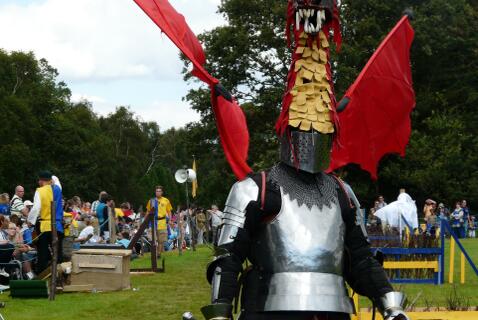Course Instructor: Dr Lucas Villegas Aristizábal - lva@queensu.ca
In Summary:
Students are expected to develop a good general knowledge of the medieval period in relation to the key themes being explored i.e., the development of feudal societies and the transformative role of religion in the period.
![]()
![]()
Course Highlights: 
-
Explore military architecture in historical context by looking at various examples of castles, their design innovations and their relationships to the surrounding landscape.
-
Discuss the conflicting viewpoints that led to the many wars being fought in Medieval Europe and gain an insight into the motivations of the kingdoms involved.
-
Your classroom itself is based in a 15th-century castle. Learn about the variety of other sources available to historian of the Middle Ages.
-
Weigh in on historiographical debates around issues that are still contentious today, such as the Crusades and the Reconquista, in lively class discussions.
Course Information:
Students will also explore the historiographical debates over concepts such as feudalism, tolerance, and crusade. The course will be taught through a combination of lectures and seminar classes. Lectures are primarily designed to give an overview of the issues and problems on a particular topic, and provide guidance for seminar discussion. Seminars will be used for debates and group/sub-group discussion of primary sources and historiographical questions. They are intended to provide an interactive and participatory learning environment. Students are expected to do the set readings for each week, and to be prepared to contribute the seminar discussion. The general approach to classes is informal, and discussion is viewed as an essential part of learning.
Learning Outcomes:
At the end of this course, successful students should be able to:
- Access and contextualise the great variety of sources available to historian of the Middle Ages.
- Produce a coherently written argument that shows their ability to critically work with both primary and secondary sources.
- Grasp how archaeologists and historians interpret physical evidence in order to reconstruct the past.
- Have a critical understanding of the historiographical debates that exist in relation to development of concepts such as ‘crusade’, ‘feudalism’, ‘Reconquista’, peasantry, etc.
- Understand the main points of tension that existed in medieval societies, such as over religion, political settlement, social stratification, political power, and legitimacy.
Experiential Learning Opportunities:
Castles represent perhaps one of the most visibly significant landmarks of the medieval period in our contemporary landscape. As such they invoke the majority of the myths perpetuated about our contemporary understandings and misunderstandings about the age. From ideas such as romantic chivalry to the violent and cruel behaviour of their inhabitants, castles provide a neat background to the popular views of the medieval past. Students will be able to evaluate the building’s military construction as a reflection of the medieval society that produced it to justify, argue, judge, and critique it as part of the evidence available to contemporary historians about their function.
Medieval Historians like other period historians rely on reading handwritten evidence to reconstruct the past. Until the advent of personal computers in the 1980’s, the majority of documents across the planet were written first by hand. Even today we still write with pen and paper exams and forms in many settings. As historians therefore both in research and as lecturers and teachers have to be able to understand multiple forms of handwriting. The use of Palaeography or the study of had written documents it is therefore of vital importance to anyone who needs to reconstruct the past. However, medieval handwriting is also evolved with time and place so this exercise will allow students to experience first-hand how to decipher the written word in a Papal letter. In our Palaeography VELO, students will use a series of tools to try to transcribe a Papal Letter Written by Pope Gregory VII to his legate in France in 1073. The Student will be using Fromthepage Software, a very potent tool which the Archive of Queens uses in their project of transcription.
Prerequisites and Exclusions:
Prerequisite: Level 2 standing, or permission of the instructor.
Course applicable to the following Majors/Medials/Minors:
HIST (option)

